Exploring Challenges in Defining Propositional Knowledge Theory
VerifiedAdded on 2023/03/31
|7
|1766
|289
Essay
AI Summary
This essay explores the concept of propositional knowledge, defined as a true belief backed by justification, and examines the difficulties associated with this view. It delves into the nature of propositional knowledge versus personal and procedural knowledge, highlighting the importance of justification in establishing validity. The essay addresses challenges like Gettier problems and the conflict between internalism and externalism, suggesting that a combination of internal and external factors is necessary for a comprehensive understanding. It emphasizes the significance of justification in fields like project management, where decisions require solid evidence and reasoning. Ultimately, the essay concludes that while true beliefs can sometimes be self-sufficient, justification remains crucial for reliable knowledge, particularly in practical domains. Desklib provides students with access to a variety of past papers and solved assignments.
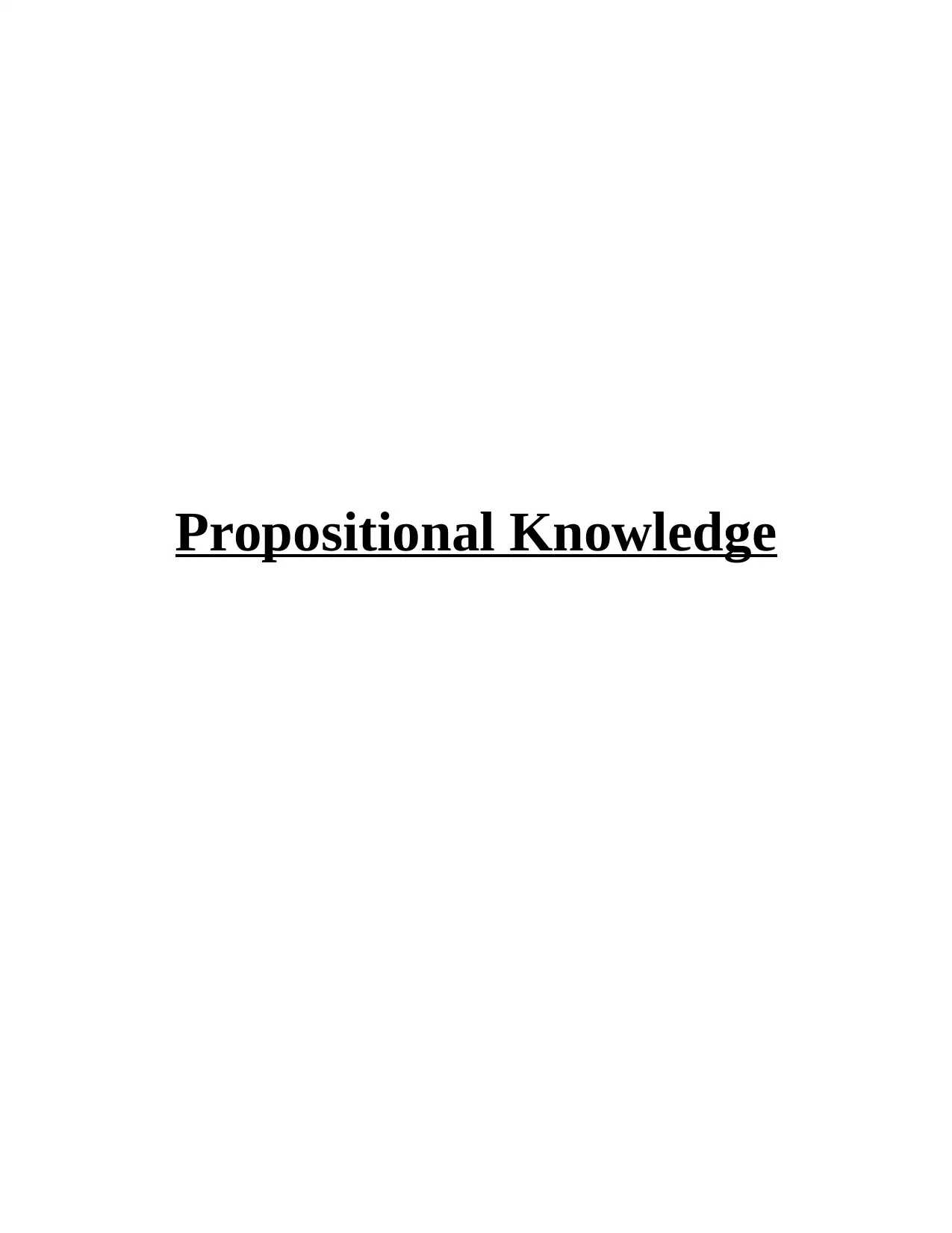
Propositional Knowledge
Paraphrase This Document
Need a fresh take? Get an instant paraphrase of this document with our AI Paraphraser
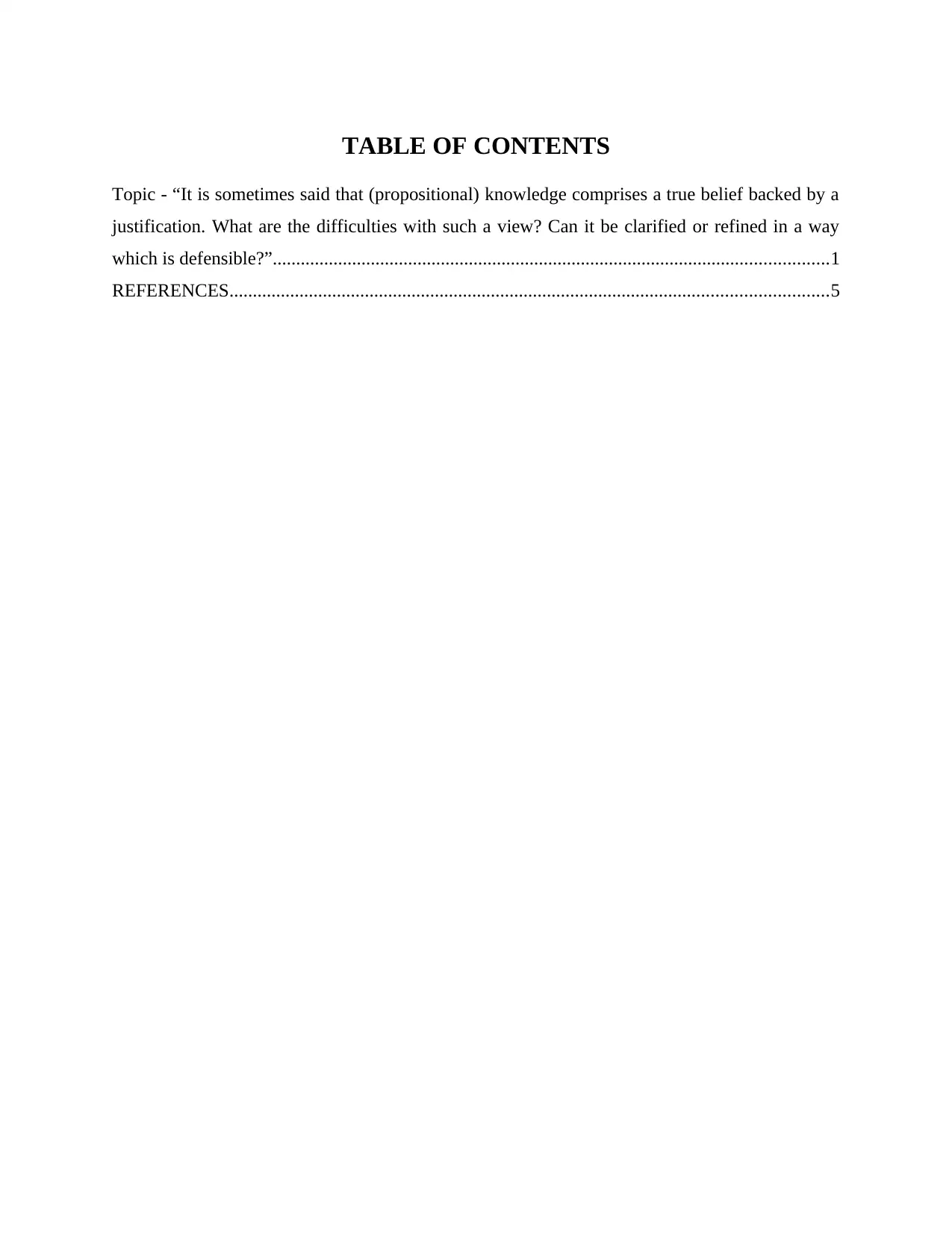
TABLE OF CONTENTS
Topic - “It is sometimes said that (propositional) knowledge comprises a true belief backed by a
justification. What are the difficulties with such a view? Can it be clarified or refined in a way
which is defensible?”.......................................................................................................................1
REFERENCES................................................................................................................................5
Topic - “It is sometimes said that (propositional) knowledge comprises a true belief backed by a
justification. What are the difficulties with such a view? Can it be clarified or refined in a way
which is defensible?”.......................................................................................................................1
REFERENCES................................................................................................................................5
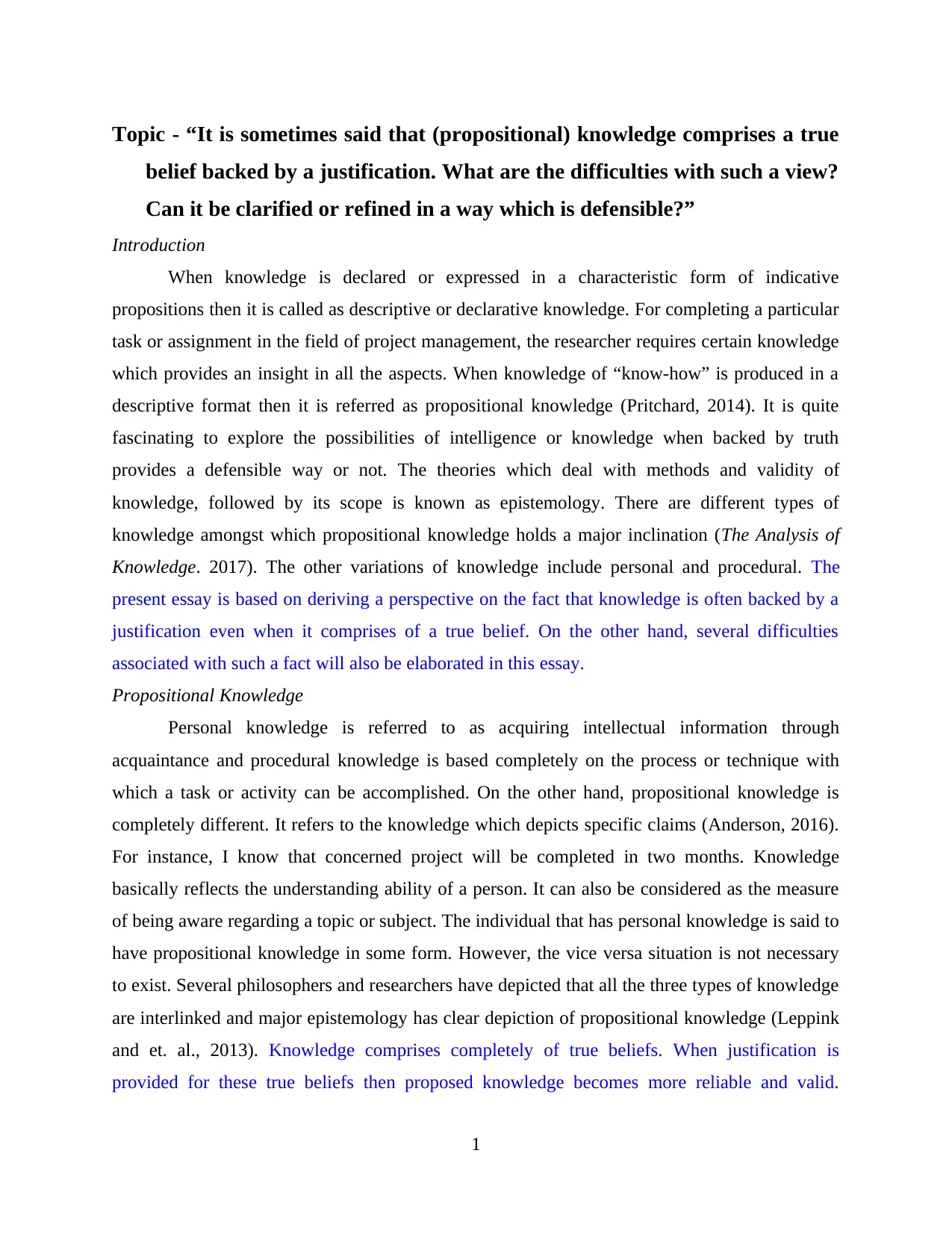
Topic - “It is sometimes said that (propositional) knowledge comprises a true
belief backed by a justification. What are the difficulties with such a view?
Can it be clarified or refined in a way which is defensible?”
Introduction
When knowledge is declared or expressed in a characteristic form of indicative
propositions then it is called as descriptive or declarative knowledge. For completing a particular
task or assignment in the field of project management, the researcher requires certain knowledge
which provides an insight in all the aspects. When knowledge of “know-how” is produced in a
descriptive format then it is referred as propositional knowledge (Pritchard, 2014). It is quite
fascinating to explore the possibilities of intelligence or knowledge when backed by truth
provides a defensible way or not. The theories which deal with methods and validity of
knowledge, followed by its scope is known as epistemology. There are different types of
knowledge amongst which propositional knowledge holds a major inclination (The Analysis of
Knowledge. 2017). The other variations of knowledge include personal and procedural. The
present essay is based on deriving a perspective on the fact that knowledge is often backed by a
justification even when it comprises of a true belief. On the other hand, several difficulties
associated with such a fact will also be elaborated in this essay.
Propositional Knowledge
Personal knowledge is referred to as acquiring intellectual information through
acquaintance and procedural knowledge is based completely on the process or technique with
which a task or activity can be accomplished. On the other hand, propositional knowledge is
completely different. It refers to the knowledge which depicts specific claims (Anderson, 2016).
For instance, I know that concerned project will be completed in two months. Knowledge
basically reflects the understanding ability of a person. It can also be considered as the measure
of being aware regarding a topic or subject. The individual that has personal knowledge is said to
have propositional knowledge in some form. However, the vice versa situation is not necessary
to exist. Several philosophers and researchers have depicted that all the three types of knowledge
are interlinked and major epistemology has clear depiction of propositional knowledge (Leppink
and et. al., 2013). Knowledge comprises completely of true beliefs. When justification is
provided for these true beliefs then proposed knowledge becomes more reliable and valid.
1
belief backed by a justification. What are the difficulties with such a view?
Can it be clarified or refined in a way which is defensible?”
Introduction
When knowledge is declared or expressed in a characteristic form of indicative
propositions then it is called as descriptive or declarative knowledge. For completing a particular
task or assignment in the field of project management, the researcher requires certain knowledge
which provides an insight in all the aspects. When knowledge of “know-how” is produced in a
descriptive format then it is referred as propositional knowledge (Pritchard, 2014). It is quite
fascinating to explore the possibilities of intelligence or knowledge when backed by truth
provides a defensible way or not. The theories which deal with methods and validity of
knowledge, followed by its scope is known as epistemology. There are different types of
knowledge amongst which propositional knowledge holds a major inclination (The Analysis of
Knowledge. 2017). The other variations of knowledge include personal and procedural. The
present essay is based on deriving a perspective on the fact that knowledge is often backed by a
justification even when it comprises of a true belief. On the other hand, several difficulties
associated with such a fact will also be elaborated in this essay.
Propositional Knowledge
Personal knowledge is referred to as acquiring intellectual information through
acquaintance and procedural knowledge is based completely on the process or technique with
which a task or activity can be accomplished. On the other hand, propositional knowledge is
completely different. It refers to the knowledge which depicts specific claims (Anderson, 2016).
For instance, I know that concerned project will be completed in two months. Knowledge
basically reflects the understanding ability of a person. It can also be considered as the measure
of being aware regarding a topic or subject. The individual that has personal knowledge is said to
have propositional knowledge in some form. However, the vice versa situation is not necessary
to exist. Several philosophers and researchers have depicted that all the three types of knowledge
are interlinked and major epistemology has clear depiction of propositional knowledge (Leppink
and et. al., 2013). Knowledge comprises completely of true beliefs. When justification is
provided for these true beliefs then proposed knowledge becomes more reliable and valid.
1
⊘ This is a preview!⊘
Do you want full access?
Subscribe today to unlock all pages.

Trusted by 1+ million students worldwide
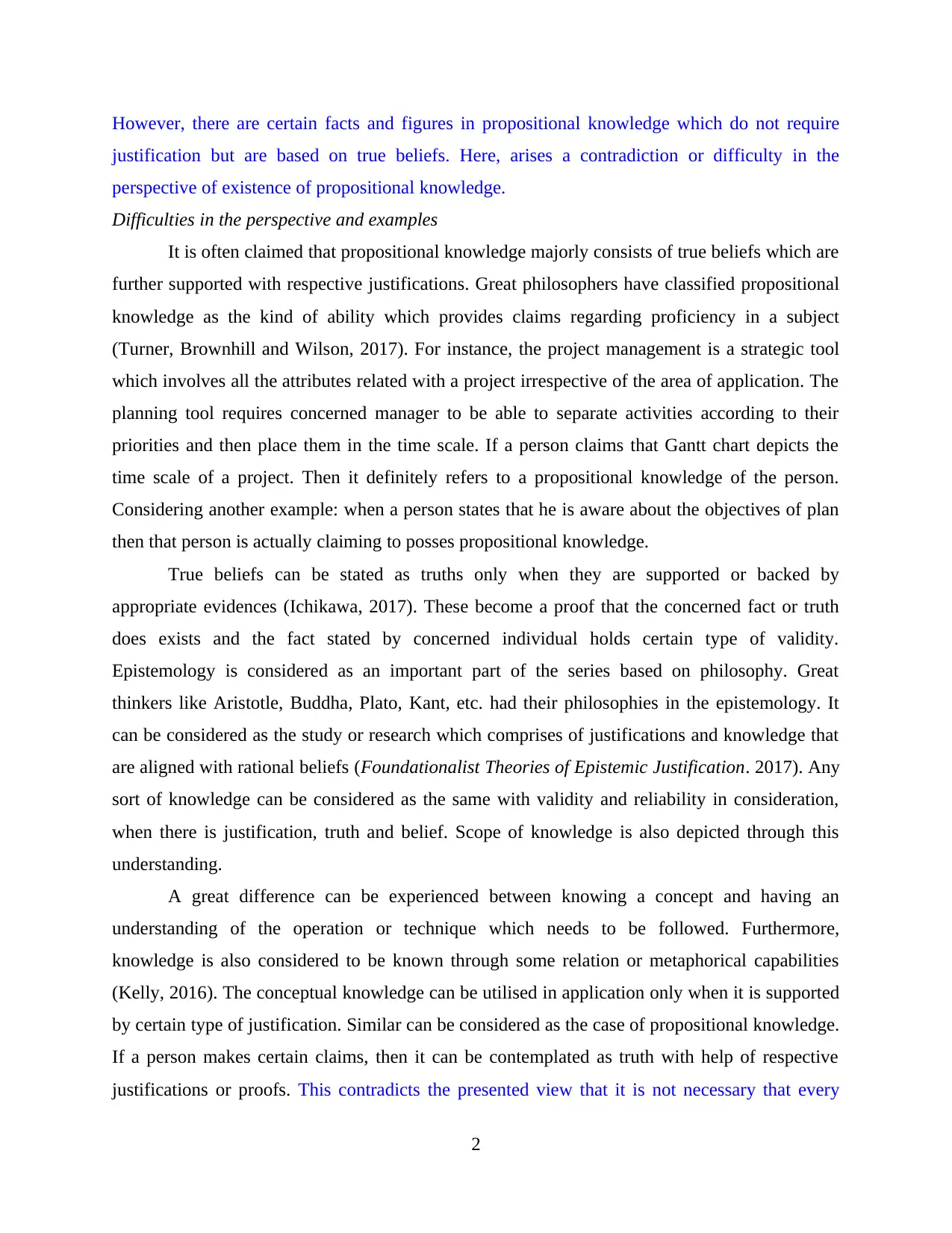
However, there are certain facts and figures in propositional knowledge which do not require
justification but are based on true beliefs. Here, arises a contradiction or difficulty in the
perspective of existence of propositional knowledge.
Difficulties in the perspective and examples
It is often claimed that propositional knowledge majorly consists of true beliefs which are
further supported with respective justifications. Great philosophers have classified propositional
knowledge as the kind of ability which provides claims regarding proficiency in a subject
(Turner, Brownhill and Wilson, 2017). For instance, the project management is a strategic tool
which involves all the attributes related with a project irrespective of the area of application. The
planning tool requires concerned manager to be able to separate activities according to their
priorities and then place them in the time scale. If a person claims that Gantt chart depicts the
time scale of a project. Then it definitely refers to a propositional knowledge of the person.
Considering another example: when a person states that he is aware about the objectives of plan
then that person is actually claiming to posses propositional knowledge.
True beliefs can be stated as truths only when they are supported or backed by
appropriate evidences (Ichikawa, 2017). These become a proof that the concerned fact or truth
does exists and the fact stated by concerned individual holds certain type of validity.
Epistemology is considered as an important part of the series based on philosophy. Great
thinkers like Aristotle, Buddha, Plato, Kant, etc. had their philosophies in the epistemology. It
can be considered as the study or research which comprises of justifications and knowledge that
are aligned with rational beliefs (Foundationalist Theories of Epistemic Justification. 2017). Any
sort of knowledge can be considered as the same with validity and reliability in consideration,
when there is justification, truth and belief. Scope of knowledge is also depicted through this
understanding.
A great difference can be experienced between knowing a concept and having an
understanding of the operation or technique which needs to be followed. Furthermore,
knowledge is also considered to be known through some relation or metaphorical capabilities
(Kelly, 2016). The conceptual knowledge can be utilised in application only when it is supported
by certain type of justification. Similar can be considered as the case of propositional knowledge.
If a person makes certain claims, then it can be contemplated as truth with help of respective
justifications or proofs. This contradicts the presented view that it is not necessary that every
2
justification but are based on true beliefs. Here, arises a contradiction or difficulty in the
perspective of existence of propositional knowledge.
Difficulties in the perspective and examples
It is often claimed that propositional knowledge majorly consists of true beliefs which are
further supported with respective justifications. Great philosophers have classified propositional
knowledge as the kind of ability which provides claims regarding proficiency in a subject
(Turner, Brownhill and Wilson, 2017). For instance, the project management is a strategic tool
which involves all the attributes related with a project irrespective of the area of application. The
planning tool requires concerned manager to be able to separate activities according to their
priorities and then place them in the time scale. If a person claims that Gantt chart depicts the
time scale of a project. Then it definitely refers to a propositional knowledge of the person.
Considering another example: when a person states that he is aware about the objectives of plan
then that person is actually claiming to posses propositional knowledge.
True beliefs can be stated as truths only when they are supported or backed by
appropriate evidences (Ichikawa, 2017). These become a proof that the concerned fact or truth
does exists and the fact stated by concerned individual holds certain type of validity.
Epistemology is considered as an important part of the series based on philosophy. Great
thinkers like Aristotle, Buddha, Plato, Kant, etc. had their philosophies in the epistemology. It
can be considered as the study or research which comprises of justifications and knowledge that
are aligned with rational beliefs (Foundationalist Theories of Epistemic Justification. 2017). Any
sort of knowledge can be considered as the same with validity and reliability in consideration,
when there is justification, truth and belief. Scope of knowledge is also depicted through this
understanding.
A great difference can be experienced between knowing a concept and having an
understanding of the operation or technique which needs to be followed. Furthermore,
knowledge is also considered to be known through some relation or metaphorical capabilities
(Kelly, 2016). The conceptual knowledge can be utilised in application only when it is supported
by certain type of justification. Similar can be considered as the case of propositional knowledge.
If a person makes certain claims, then it can be contemplated as truth with help of respective
justifications or proofs. This contradicts the presented view that it is not necessary that every
2
Paraphrase This Document
Need a fresh take? Get an instant paraphrase of this document with our AI Paraphraser
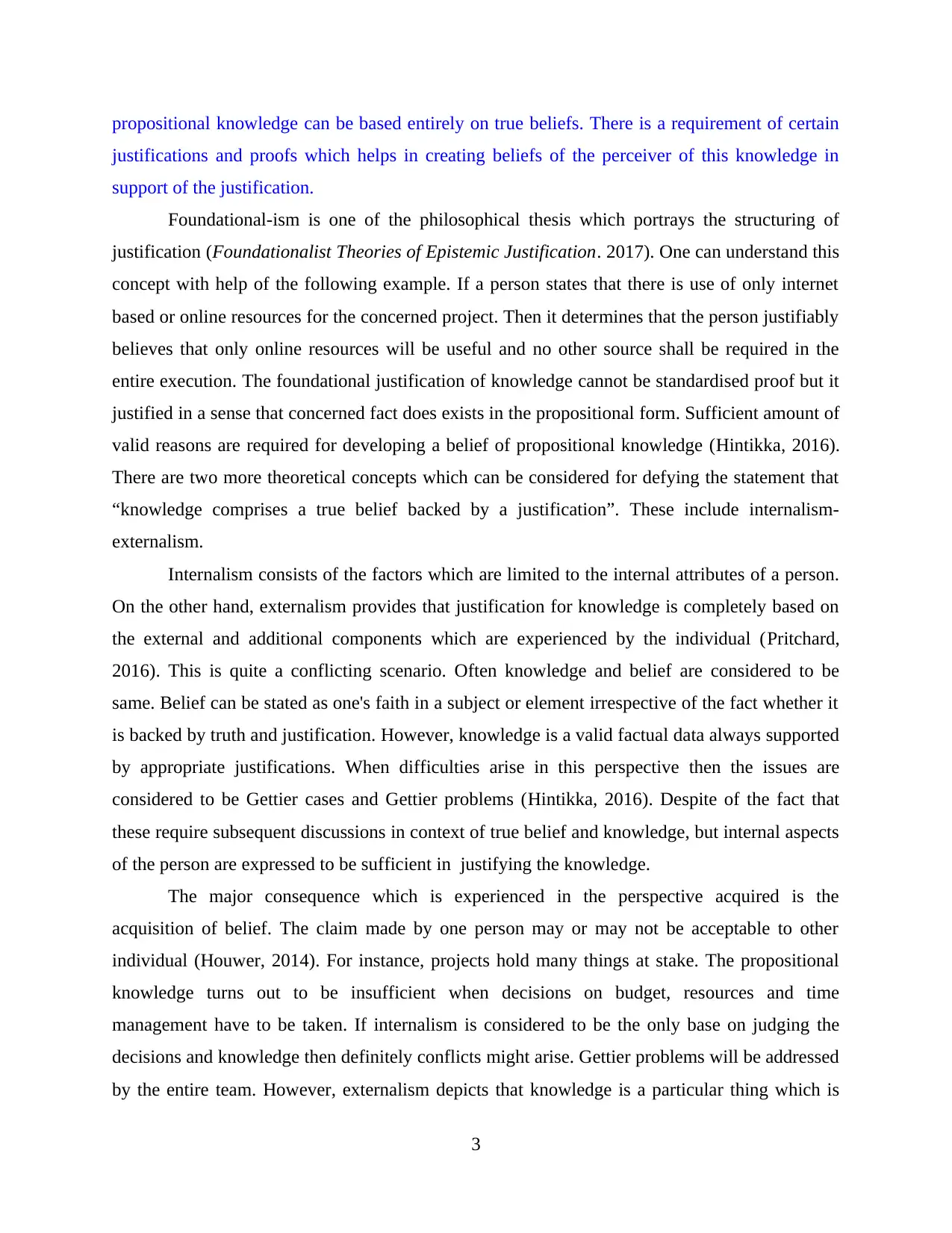
propositional knowledge can be based entirely on true beliefs. There is a requirement of certain
justifications and proofs which helps in creating beliefs of the perceiver of this knowledge in
support of the justification.
Foundational-ism is one of the philosophical thesis which portrays the structuring of
justification (Foundationalist Theories of Epistemic Justification. 2017). One can understand this
concept with help of the following example. If a person states that there is use of only internet
based or online resources for the concerned project. Then it determines that the person justifiably
believes that only online resources will be useful and no other source shall be required in the
entire execution. The foundational justification of knowledge cannot be standardised proof but it
justified in a sense that concerned fact does exists in the propositional form. Sufficient amount of
valid reasons are required for developing a belief of propositional knowledge (Hintikka, 2016).
There are two more theoretical concepts which can be considered for defying the statement that
“knowledge comprises a true belief backed by a justification”. These include internalism-
externalism.
Internalism consists of the factors which are limited to the internal attributes of a person.
On the other hand, externalism provides that justification for knowledge is completely based on
the external and additional components which are experienced by the individual (Pritchard,
2016). This is quite a conflicting scenario. Often knowledge and belief are considered to be
same. Belief can be stated as one's faith in a subject or element irrespective of the fact whether it
is backed by truth and justification. However, knowledge is a valid factual data always supported
by appropriate justifications. When difficulties arise in this perspective then the issues are
considered to be Gettier cases and Gettier problems (Hintikka, 2016). Despite of the fact that
these require subsequent discussions in context of true belief and knowledge, but internal aspects
of the person are expressed to be sufficient in justifying the knowledge.
The major consequence which is experienced in the perspective acquired is the
acquisition of belief. The claim made by one person may or may not be acceptable to other
individual (Houwer, 2014). For instance, projects hold many things at stake. The propositional
knowledge turns out to be insufficient when decisions on budget, resources and time
management have to be taken. If internalism is considered to be the only base on judging the
decisions and knowledge then definitely conflicts might arise. Gettier problems will be addressed
by the entire team. However, externalism depicts that knowledge is a particular thing which is
3
justifications and proofs which helps in creating beliefs of the perceiver of this knowledge in
support of the justification.
Foundational-ism is one of the philosophical thesis which portrays the structuring of
justification (Foundationalist Theories of Epistemic Justification. 2017). One can understand this
concept with help of the following example. If a person states that there is use of only internet
based or online resources for the concerned project. Then it determines that the person justifiably
believes that only online resources will be useful and no other source shall be required in the
entire execution. The foundational justification of knowledge cannot be standardised proof but it
justified in a sense that concerned fact does exists in the propositional form. Sufficient amount of
valid reasons are required for developing a belief of propositional knowledge (Hintikka, 2016).
There are two more theoretical concepts which can be considered for defying the statement that
“knowledge comprises a true belief backed by a justification”. These include internalism-
externalism.
Internalism consists of the factors which are limited to the internal attributes of a person.
On the other hand, externalism provides that justification for knowledge is completely based on
the external and additional components which are experienced by the individual (Pritchard,
2016). This is quite a conflicting scenario. Often knowledge and belief are considered to be
same. Belief can be stated as one's faith in a subject or element irrespective of the fact whether it
is backed by truth and justification. However, knowledge is a valid factual data always supported
by appropriate justifications. When difficulties arise in this perspective then the issues are
considered to be Gettier cases and Gettier problems (Hintikka, 2016). Despite of the fact that
these require subsequent discussions in context of true belief and knowledge, but internal aspects
of the person are expressed to be sufficient in justifying the knowledge.
The major consequence which is experienced in the perspective acquired is the
acquisition of belief. The claim made by one person may or may not be acceptable to other
individual (Houwer, 2014). For instance, projects hold many things at stake. The propositional
knowledge turns out to be insufficient when decisions on budget, resources and time
management have to be taken. If internalism is considered to be the only base on judging the
decisions and knowledge then definitely conflicts might arise. Gettier problems will be addressed
by the entire team. However, externalism depicts that knowledge is a particular thing which is
3
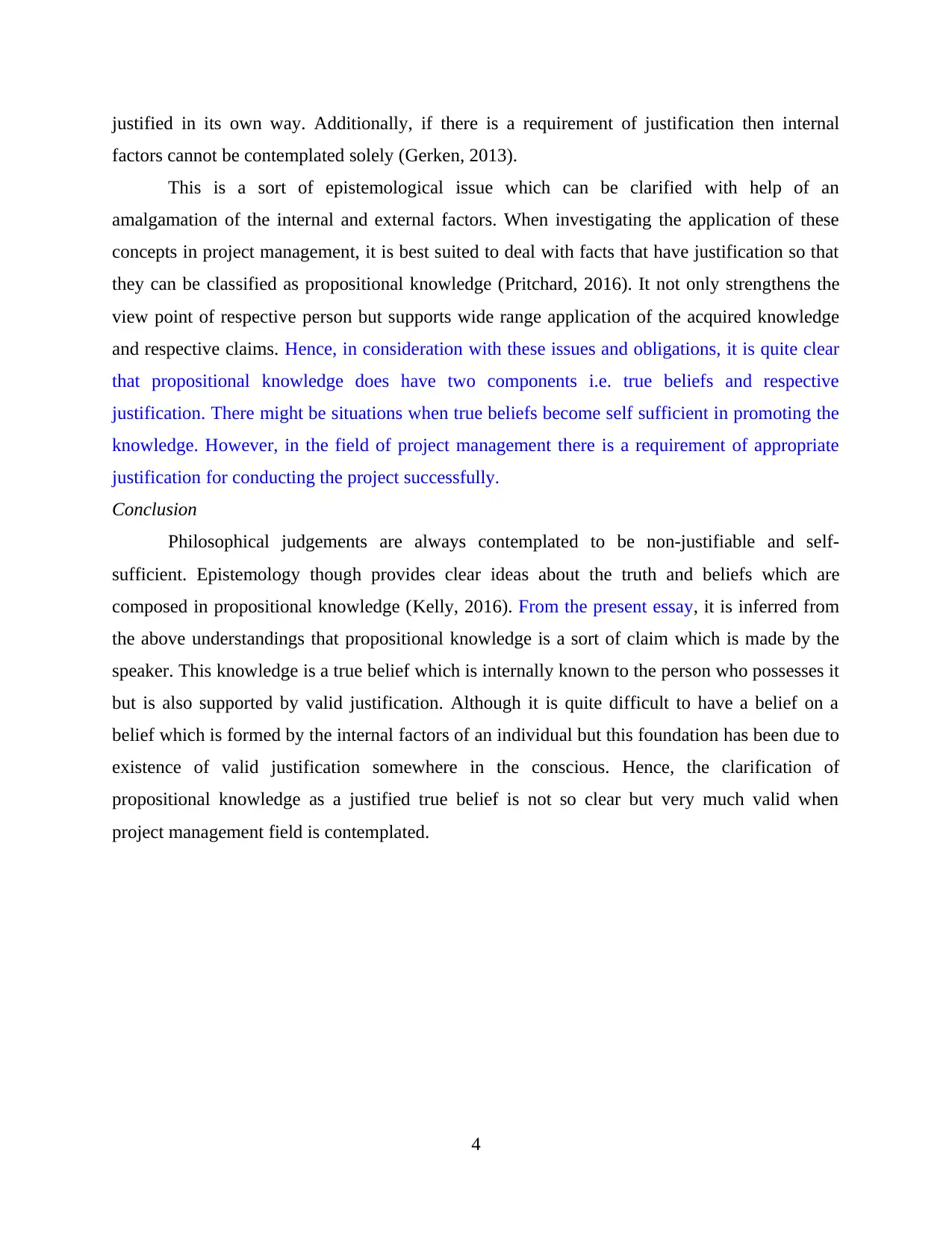
justified in its own way. Additionally, if there is a requirement of justification then internal
factors cannot be contemplated solely (Gerken, 2013).
This is a sort of epistemological issue which can be clarified with help of an
amalgamation of the internal and external factors. When investigating the application of these
concepts in project management, it is best suited to deal with facts that have justification so that
they can be classified as propositional knowledge (Pritchard, 2016). It not only strengthens the
view point of respective person but supports wide range application of the acquired knowledge
and respective claims. Hence, in consideration with these issues and obligations, it is quite clear
that propositional knowledge does have two components i.e. true beliefs and respective
justification. There might be situations when true beliefs become self sufficient in promoting the
knowledge. However, in the field of project management there is a requirement of appropriate
justification for conducting the project successfully.
Conclusion
Philosophical judgements are always contemplated to be non-justifiable and self-
sufficient. Epistemology though provides clear ideas about the truth and beliefs which are
composed in propositional knowledge (Kelly, 2016). From the present essay, it is inferred from
the above understandings that propositional knowledge is a sort of claim which is made by the
speaker. This knowledge is a true belief which is internally known to the person who possesses it
but is also supported by valid justification. Although it is quite difficult to have a belief on a
belief which is formed by the internal factors of an individual but this foundation has been due to
existence of valid justification somewhere in the conscious. Hence, the clarification of
propositional knowledge as a justified true belief is not so clear but very much valid when
project management field is contemplated.
4
factors cannot be contemplated solely (Gerken, 2013).
This is a sort of epistemological issue which can be clarified with help of an
amalgamation of the internal and external factors. When investigating the application of these
concepts in project management, it is best suited to deal with facts that have justification so that
they can be classified as propositional knowledge (Pritchard, 2016). It not only strengthens the
view point of respective person but supports wide range application of the acquired knowledge
and respective claims. Hence, in consideration with these issues and obligations, it is quite clear
that propositional knowledge does have two components i.e. true beliefs and respective
justification. There might be situations when true beliefs become self sufficient in promoting the
knowledge. However, in the field of project management there is a requirement of appropriate
justification for conducting the project successfully.
Conclusion
Philosophical judgements are always contemplated to be non-justifiable and self-
sufficient. Epistemology though provides clear ideas about the truth and beliefs which are
composed in propositional knowledge (Kelly, 2016). From the present essay, it is inferred from
the above understandings that propositional knowledge is a sort of claim which is made by the
speaker. This knowledge is a true belief which is internally known to the person who possesses it
but is also supported by valid justification. Although it is quite difficult to have a belief on a
belief which is formed by the internal factors of an individual but this foundation has been due to
existence of valid justification somewhere in the conscious. Hence, the clarification of
propositional knowledge as a justified true belief is not so clear but very much valid when
project management field is contemplated.
4
⊘ This is a preview!⊘
Do you want full access?
Subscribe today to unlock all pages.

Trusted by 1+ million students worldwide
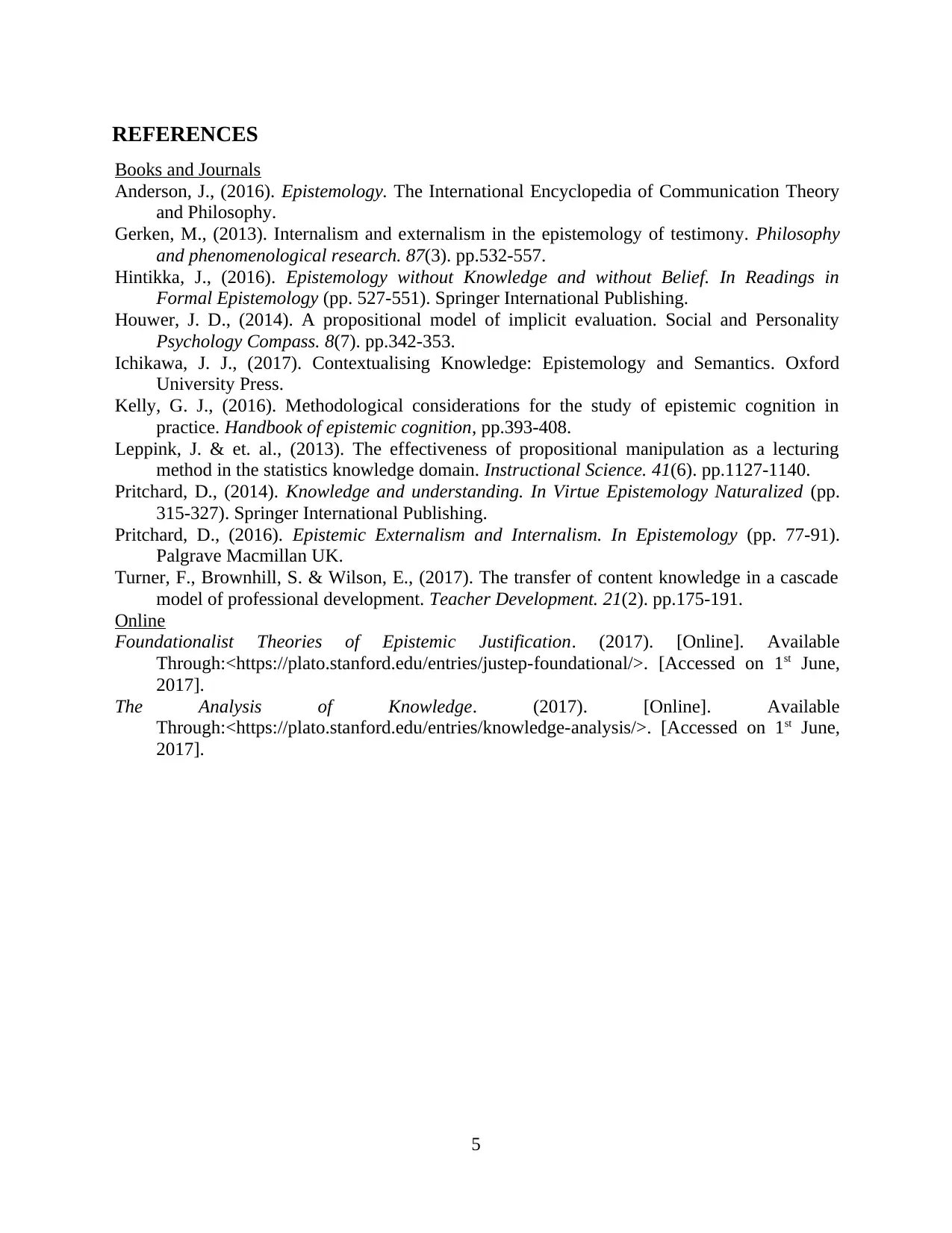
REFERENCES
Books and Journals
Anderson, J., (2016). Epistemology. The International Encyclopedia of Communication Theory
and Philosophy.
Gerken, M., (2013). Internalism and externalism in the epistemology of testimony. Philosophy
and phenomenological research. 87(3). pp.532-557.
Hintikka, J., (2016). Epistemology without Knowledge and without Belief. In Readings in
Formal Epistemology (pp. 527-551). Springer International Publishing.
Houwer, J. D., (2014). A propositional model of implicit evaluation. Social and Personality
Psychology Compass. 8(7). pp.342-353.
Ichikawa, J. J., (2017). Contextualising Knowledge: Epistemology and Semantics. Oxford
University Press.
Kelly, G. J., (2016). Methodological considerations for the study of epistemic cognition in
practice. Handbook of epistemic cognition, pp.393-408.
Leppink, J. & et. al., (2013). The effectiveness of propositional manipulation as a lecturing
method in the statistics knowledge domain. Instructional Science. 41(6). pp.1127-1140.
Pritchard, D., (2014). Knowledge and understanding. In Virtue Epistemology Naturalized (pp.
315-327). Springer International Publishing.
Pritchard, D., (2016). Epistemic Externalism and Internalism. In Epistemology (pp. 77-91).
Palgrave Macmillan UK.
Turner, F., Brownhill, S. & Wilson, E., (2017). The transfer of content knowledge in a cascade
model of professional development. Teacher Development. 21(2). pp.175-191.
Online
Foundationalist Theories of Epistemic Justification. (2017). [Online]. Available
Through:<https://plato.stanford.edu/entries/justep-foundational/>. [Accessed on 1st June,
2017].
The Analysis of Knowledge. (2017). [Online]. Available
Through:<https://plato.stanford.edu/entries/knowledge-analysis/>. [Accessed on 1st June,
2017].
5
Books and Journals
Anderson, J., (2016). Epistemology. The International Encyclopedia of Communication Theory
and Philosophy.
Gerken, M., (2013). Internalism and externalism in the epistemology of testimony. Philosophy
and phenomenological research. 87(3). pp.532-557.
Hintikka, J., (2016). Epistemology without Knowledge and without Belief. In Readings in
Formal Epistemology (pp. 527-551). Springer International Publishing.
Houwer, J. D., (2014). A propositional model of implicit evaluation. Social and Personality
Psychology Compass. 8(7). pp.342-353.
Ichikawa, J. J., (2017). Contextualising Knowledge: Epistemology and Semantics. Oxford
University Press.
Kelly, G. J., (2016). Methodological considerations for the study of epistemic cognition in
practice. Handbook of epistemic cognition, pp.393-408.
Leppink, J. & et. al., (2013). The effectiveness of propositional manipulation as a lecturing
method in the statistics knowledge domain. Instructional Science. 41(6). pp.1127-1140.
Pritchard, D., (2014). Knowledge and understanding. In Virtue Epistemology Naturalized (pp.
315-327). Springer International Publishing.
Pritchard, D., (2016). Epistemic Externalism and Internalism. In Epistemology (pp. 77-91).
Palgrave Macmillan UK.
Turner, F., Brownhill, S. & Wilson, E., (2017). The transfer of content knowledge in a cascade
model of professional development. Teacher Development. 21(2). pp.175-191.
Online
Foundationalist Theories of Epistemic Justification. (2017). [Online]. Available
Through:<https://plato.stanford.edu/entries/justep-foundational/>. [Accessed on 1st June,
2017].
The Analysis of Knowledge. (2017). [Online]. Available
Through:<https://plato.stanford.edu/entries/knowledge-analysis/>. [Accessed on 1st June,
2017].
5
1 out of 7
Your All-in-One AI-Powered Toolkit for Academic Success.
+13062052269
info@desklib.com
Available 24*7 on WhatsApp / Email
![[object Object]](/_next/static/media/star-bottom.7253800d.svg)
Unlock your academic potential
Copyright © 2020–2026 A2Z Services. All Rights Reserved. Developed and managed by ZUCOL.
